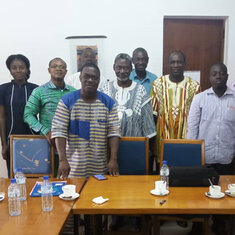Pagecontent
Vocational training for renewable energy in Burkina Faso - BBEE
Solar energy has a bright future in sunny Burkina Faso. To realise this future, vocational schools need curricula adapted to the requirements of the job market as well as modern teaching equipment.
We are implementing the project Vocational training renewable energy in Burkina Faso for the Austrian federal state of Vorarlberg. The long-term cooperation is planned in three phases for a total period of ten years from 2018 to 2028. For the first phase, the project focuses on schools in the two urban centres of Ouagadougou (Lycée de la Jeunesse, Lycée Professionnel Régional du Centre, Lycée Professionnel Dr. Bruno BUCHWIESER) and Bobo-Dioulasso (Lycée Professionnel Régional Guimbi Ouattara). In the second phase, which runs until 2026, two more vocational schools will be added: the Lycée Songtaaba and the Lycée Nelson Mandela.We are also partnering with the École Normale Supérieure (ENS) in Koudougou to strengthen the quality of training of teachers.
RENEWABLE ENERGY CREATES NEW PERSPECTIVES
In close collaboration with local actors and the state of Vorarlberg, we aim to improve access to sustainable energy for all. To achieve this, we are working with our partners to provide quality training opportunities and increase employability of graduates in the fields of renewable energy and energy efficiency. We support our partner schools in installing photovoltaic systems for demonstration purposes, improving training curricula, strengthening teachers' skills in renewable energy and by providing high quality teaching equipment and materials to students, among others.
More than 5,000 people are benefiting from the first phase of the project. This number is to be increased to a total of 8,400 beneficiaries in the second phase. This includes 1,000 students and 70 specialised teachers from the renewable energy training programmes in four partner schools, 300 companies in the field of photovoltaics and 25 people in the responsible ministries. An additional 6,000 students will benefit from improved school infrastructure.

